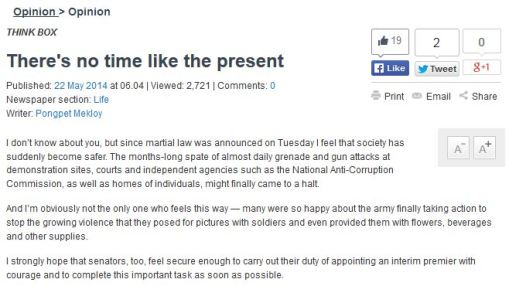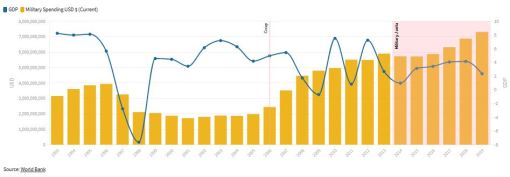The 2014 military coup was not unexpected. After all, the military brass had been planning it and the People’s Democratic Reform Committee had been demonstrating for months in support of a military intervention.
Here we recall some of our posts at the time of the coup, with some editing.
The story of how it happened, from the Bangkok Post, via Matichon, is worth recalling:
At 2pm on Thursday, representatives of seven groups began the second day of peace talks hosted by army commander Prayuth Chan-ocha.
The general began by asking all sides what they could do about the five issues he had asked them to consider on the previous day, a source at the closed-door meeting told Matichon Online.
Armed soldiers stand guard during a coup at the Army Club where the army chief held a meeting with all rival factions in central Bangkok on May 22. (Reuters photo)
Wan Muhamad Nor Matha of the Pheu Thai Party said the best his party could do was to ask ministers to take leave of absence or vacation.
Chaikasem Nitisiri of the caretaker government insisted cabinet members would be breaking the law and could be sued later if they resigned.
Abhisit Vejjajiva of the Democrat Party disagreed, citing as a precedent Visanu Krue-ngam, who had previously resigned as acting deputy prime minister, but Mr Chaikasem stood his ground.
Veerakarn Musikapong of the United Front for Democracy Against Dictatorship (UDD) said this debate was useless and a person would need a mattress and a pillow if they were to continue with it.
This was like discussing a religious faith in which everyone was firm in his belief. The army chief had a lot on his shoulders now because he came when the water was already waist-high.
If he continued, Mr Veerakarn said, he would be drowned. The army chief should walk away and announced there would be election. That way, his name would be untarnished.
At this point, Gen Prayuth snapped back: “Stop it. Religious issues I don’t know much about. What I do know is I’ll hunt down each and every one of those ‘infidels’. Don’t worry about me drowning. I’m a good swimmer and I’ve studied the situation for three years.
“Back in 2010, I didn’t have absolute power. So don’t fight me. I was accused of accepting six billion baht in exchange of doing nothing. I insist I didn’t get even one baht.”
At this point, Jatuporn Prompan of the UDD appeared more appeasing, saying since an election could not be held now anyway, the best solution was to hold a referendum on whether national reform should come before or after the next election.
The debate went on for a while before Suthep Thaugsuban of the People’s Democratic Reform Committee said political parties were not involved in this.
“This was a problem between the UDD and the PDRC,” he declared.
He proposed the two groups meet in a separate session.
Mr Abhisit said the government should also join in, but Mr Suthep insisted on only the people’s groups.
Gen Prayuth allowed the two groups to meet separately.
In the meantime, Mr Abhisit suggested other participants should go home now that the two sides were in talks, but Gen Prayuth insisted on everyone staying where they were until a conclusion was reached.
The UDD and PDRC sides talked for 30 minutes.
After that, Gen Prayuth led them back to the meeting, saying he would announce the results of the talks.
At that point, Mr Suthep asked for a minute and walked over to say something with Gen Prayuth, with Mr Jatuporn present.
When they were done, Gen Prayuth said: “It’s nothing. We talked about how the restrooms are not in order.”
After that, the army chief asked the government side whether it insisted on not resigning.
Mr Chaikasem said:” We won’t resign”.
Gen Prayuth then declared: “If that’s the case, the Election Commission need not talk about the polls and the Senate need not talk about Section 7.”
He then stood up and spoke in a loud voice: “I’m sorry. I have to seize the ruling power.”
It was 4.32pm.
At that point some of the attendees still thought he was joking.
They changed their minds when the general walked to the exit and turned back to tell them in a stern voice: “You all stay here. Don’t go anywhere.”
He then left the room.
After that armed soldiers came to detain the participants in groups. Notably, Prompong Nopparit who came in the government’s quota was detained with the UDD group in a separate room.
Mr Veerakarn had a smile on his face and forgot his cane.
Mr Abhisit told Varathep Rattanakorn and Chadchart Sittipunt of the government: “I told you so”.
A pale-faced Chadchart snapped:”So what? What’s the point of saying it now?”
The military put the Democrat and Pheu Thai parties in the same room while the rest were put in different rooms.
The senators and election commissioners were let out first.
The rest is history.
The mainstream media essentially welcomed the coup. We observed that the tenor of announcements in the controlled media is that a National Order and Maintenance Committee – the military bosses – are arresting people, grabbing control of even more of the media, implementing a curfew and the usual things these military leaders do when they take over. There are some unconfirmed reports of shooting.
Supreme Commander Gen Thanasak Pratimaprakorn, Air Force chief ACM Prajin Juntong, Navy chef Adm Narong Pipattanasai, Police chief Pol Gen Adul Saengsingkaew became Prayuth’s deputies.
It is becoming clear that the plan is exactly what the royalist and anti-democrats have wanted: a search for a “neutral” premier. Look for a former military commander or a privy councilor or someone who fits both categories.

Given that the Bangkok Post published not one but two op-eds supportive of military intervention today, we assume the editorial board is dancing in the streets (until curfew at 10 P.M. One was by Voranai Vanijaka, who stated, among other now dumb as a box of rocks statements, this:
Look for an interim government, appointed. Look for reforms, not necessarily to tackle corruption or to solve the education crisis, those issues take years, and we wouldn’t want an appointed government for years.
But definitely look for reform measures to ensure future political stability and economic opportunity. In this, look for factions and individuals to be persuaded to fall in line and do as told.
In addition, look for these measures to be more effective in setting Thailand on the ‘’right’’ course, as compared to after the 2006 coup.
Then, look for a reasonable period of time until the military is sure that the peace is kept. Three months, six months, a year, however long it may take.
After which, look for the return of the democratic election and things to actually go back to normal – well, normal for Thailnd, that is.
A scenario is mere speculation based on past lessons to ascertain likely future possibilities. If there is any certainty, it is that democratic elections will return.
The other op-ed was by a died-in-the-wool anti-democrat at the Post:

Following these two cheering op-eds for the military and its form of fascism, the Bangkok Post managed an editorial that polished Prayuth’s ego and posterior and justified military intentions. It concluded with this: “The sad thing is it’s the very act of a military takeover that is likely to stir up stiff resistance, provoke acts of violence and possibly cause more loss of life. This coup is not the solution.” Well, of course it is not the solution, but the Post has been part of the problem, failing to clearly stand for democratic process.
Kasit Piromya, former foreign minister under a fully anti-democratic Democrat Party, propagandized and defended the coup at the BBC.
He noted the anti-democrat call for the military to intervene “for quite some time.”
He argued – and recall this was early on – that the caches of arms found “amongst the red shirts” meant there was going to be great violence. It has to be said that the Army suddenly finding caches of weapons is a propaganda device they have regularly used in the past. He’s fully on board with the military, as you’d expect.
His comment on the “problem” of democracy is that his side can’t win, and the majority always win. That’s our interpretation of his anti-democrat tripe. He reckons this is the military resetting democracy. He sounds like he’s still in the yellow of 2006; it was the same story then.
Some of these commentators took years to learn that the military intervention was a huge disaster. Others continue to support military, monarchy and fascism.
Update: We noticed a couple of articles in the English media on the anniversary of Thailand’s bleakest of coups. At Thai PBS, there’s a story on Yingluck Shinawatra’s response. Among other comments she observes:
The past seven years, since the coup, are seven years of lost development opportunity and seven years of the people’s voice being ignored. It is seven years that people have been hoping for a People’s Constitution, which nobody knows whether it will ever be realised….
That’s pretty much it, but no one could possibly have thought that this set of dinosaurs was going to be progressive or interested in anyone other than themselves and the monarch, who must, at all cost, be revered and coddled.
The Bangkok Post has two stories. One is a kind of “evenhanded” account that sees the only support for the junta-post-junta being expressed by its people. Government and military spokespersons come up with a large pile of buffalo manure.
Government spokesman Anucha Burapachaisri insisted the government “is trying to prevent clashes between those involved and is not acting as a party to the conflict…”. He seems to think everyone is as stupid as he is. And to prove his own stupidity, his claim for “progress” after seven years was this: “reforms initiated by the government have made substantial progress with laws being amended to accommodate changes. When the bills are enacted, the reforms will be more visible.” Yes, that’s a zero.
The Ministry of Defense spokesman Kongcheep Tantravanich is worse still, making stuff up, squishing manure and making military manure piles. He invents a story that “the NCPO stepped in to end political conflict and solve problems such as illegal unreported and unregulated (IUU) fishing, and aviation safety problems.” He’s bonkers.
The other Post story is more about the zero outcomes (for most of us) and the bleakness. But the really sad thing is the future:
Unless the constitution is changed to prevent senators from voting on a PM before the next election, Gen Prayut will likely be the prime minister for another six years, for a total of 13 years, beating Field Marshal Plaek Phibunsongkhram, the longest-serving PM to date with 9½ years in office.
A more terrible political future we cannot imagine, unless it is Vajiralongkorn’s vision of neo-absolutism. Only the students saved us from that (at least for the moment).











